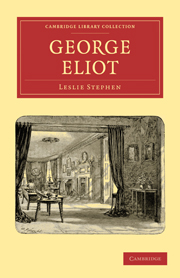Book contents
- Frontmatter
- Contents
- CHAPTER I EARLY LIFE
- CHAPTER II COVENTRY
- CHAPTER III “THE WESTMINSTER REVIEW”
- CHAPTER IV “SCENES OF CLERICAL LIFE”
- CHAPTER V “ADAM BEDE”
- CHAPTER VI “THE MILL ON THE FLOSS”
- CHAPTER VII “SILAS MARNER”
- CHAPTER VIII MIDDLE LIFE
- CHAPTER IX “ROMOLA”
- CHAPTER X “FELIX HOLT”
- CHAPTER XI “THE SPANISH GYPSY”
- CHAPTER XII “MIDDLEMARCH”
- CHAPTER XIII “DANIEL DERONDA”
- CHAPTER XIV CONCLUSION
- INDEX
CHAPTER VIII - MIDDLE LIFE
Published online by Cambridge University Press: 05 July 2011
- Frontmatter
- Contents
- CHAPTER I EARLY LIFE
- CHAPTER II COVENTRY
- CHAPTER III “THE WESTMINSTER REVIEW”
- CHAPTER IV “SCENES OF CLERICAL LIFE”
- CHAPTER V “ADAM BEDE”
- CHAPTER VI “THE MILL ON THE FLOSS”
- CHAPTER VII “SILAS MARNER”
- CHAPTER VIII MIDDLE LIFE
- CHAPTER IX “ROMOLA”
- CHAPTER X “FELIX HOLT”
- CHAPTER XI “THE SPANISH GYPSY”
- CHAPTER XII “MIDDLEMARCH”
- CHAPTER XIII “DANIEL DERONDA”
- CHAPTER XIV CONCLUSION
- INDEX
Summary
The publication of Silas Marner marks an important change in the direction of George Eliot's work. The memories of early days are no longer to be the dominant factor in her imaginative world; and henceforth one charm disappears, however completely, to the taste of some readers, it may be replaced by others. She has begun, as we have seen, to consider theories about the relations of ethics and æsthetics and psychology; and hereafter the influence of her theory upon her writing will be more obvious. This brings one in sight of certain general canons of criticism, upon which I do not desire to touch any further than is necessary for an appreciation of George Eliot herself. Yet the moral and philosophical implications of her novels are so prominent that it is impossible to omit altogether one or two questions as to their propriety. Many critics seem to lose their temper at any suggestion that a poem or a novel can have any legitimate didactic purpose. Everybody must sympathise with their annoyance. It is undeniably vexatious to take up a novel and find that it is a pamphlet in disguise, and that the envelope of fiction merely coats the insipid pill of a moral platitude. We have all suffered from such well-meant impositions in our childhood; “we,” I mean, who were born in the good old days when children read the Parent's Assistant and Hymns for Infant Minds. Somehow many of the old stories with a moral were very delightful.
- Type
- Chapter
- Information
- George Eliot , pp. 112 - 121Publisher: Cambridge University PressPrint publication year: 2010First published in: 1902



